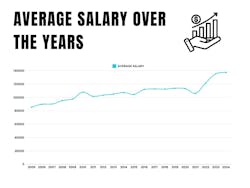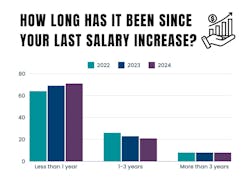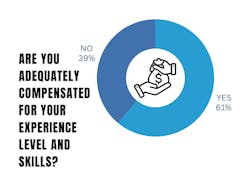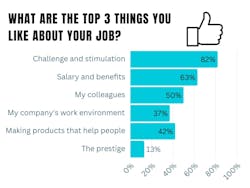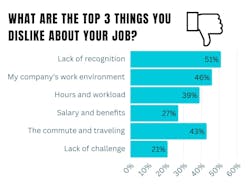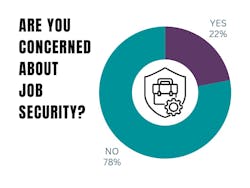How Much Do Chemical Engineers Make in 2024? Chemical Industry Salaries Continue to Rise
“Each job in the chemical manufacturing sector supports more than six jobs in other parts of the economy,” said Martha Gilchrist Moore, chief economist of the American Chemistry Council (ACC) during her mid-year State of the Industry report for Chemical Processing. “So, … the industry is supporting jobs in local communities around the country, and part of that is [due to ] the above-average wages that the industry pays.”
In fact, the U.S. Bureau of Labor Statistics reported the median annual wage for chemical engineers as of May 2023 (the latest available data) was $112,100. However, some participants of our annual Job Satisfaction and Salary Survey said that number is too low. “… A large part of my team's compensation was $185,000 or more, with several over $200,000 plus equity bonus,” shared one respondent.
As a result, our respondents report an average salary of $137,000 this year — a gradual rise from the $135,000 average for 2023 following a larger jump from $121,500 in 2022 (Figure 1). In addition, our average sits between the Bureau’s conservative number and the American Institute of Chemical Engineers’ (AIChE) biannual survey reporting salaries of its members averaging $150,000 in 2023.
In addition to the increase in average salary, the average bonus also rose. Since 2021, the average bonus has increased by at least $1,000 each year. For 2024, the average bonus fell slightly short of this trend at $9,351, still up from $8,415 last year. Of those who received bonuses, more than half of our respondents took home more than $10,000, an 8% jump from 2023’s 46% (Figure 2) and well ahead of the 37% that stood in this bracket in 2022.
(For context, year to year, we typically see no more than a 2%–3% variation in any particular response to salary survey questions. Any larger differentiation is notable and worth reporting here.)
While more than 70% of respondents report receiving a pay increase within the last year (Figure 3), and 10% more disclosed receiving raises between 2.5% and 5%, the average raise fell slightly from 4.85% last year to 4.3% for 2024. While data show this number likely should be higher, the dip could be attributed to fewer total respondents compared to last year, which skews the calculations. (It’s worth noting that all other data falls in line with previous years’ responses despite a dip in the number of survey participants.)
More than half of respondents (61%) also shared that their compensation this year adequately matches their experience and skill level (Figure 4).
“Compensation at my level is great for my years of experience and knowledge base. I've been given an opportunity to grow into my current position so my compensation reflects that well,” shared one respondent.
“Elevated and sustained compensation isn't the result of a single move/promotion but is the result of continually adding value to the organization and team. Like interest, it compounds,” explained one respondent about his thoughts on his compensation.
“I am grateful for the compensation and benefits provided by my employer,” shared another.
“My compensation is currently satisfactory, but I am keeping my eyes open to the market moves,” said another.
“My company compensates employees heavily based on company and individual performance (almost 30% of compensation is variable), which encourages us to work more efficiently.”
Alternatively, 39% have the opposite view, with a few survey participants voicing their dissatisfaction with their compensation.
“I thought a 24% increase in compensation last year would motivate me, but instead it made me bitter that I had been undercompensated for so long,” noted one respondent.
“I am slightly underpaid for my responsibility level. Would like more vacation,” said another contributor.
“[My compensation] seems low for someone with my experience, responsibility and performance rating,” shared another.
I thought a 24% increase in compensation last year would motivate me, but instead it made me bitter that I had been undercompensated for so long.
Job Satisfaction and More
Despite some grumblings regarding compensation, overall job satisfaction is 90% (Figure 5). Many respondents say the positive work environment and challenging roles keep them satisfied and motivated in their careers. Nearly 82% of respondents shared the challenge and stimulation as one of the top 3 things they like about their job (Figure 6).
The following response samples provide some insight into current attitudes:
- “The job I have now matches the skillset I've built up over my career very well. There are a lot of challenging issues to work on, and I can readily see the results of my work.”
- “I like improving things and fixing problems, which makes my job even easier through better reliability, improved product quality and less reactive work, while making step changes in safety performance and environmental compliance.”
- “Learning new things every day is what keeps me engaged and motivated.”
Rounding out the top three, more than half (63%) touted the salary and benefits and 50% said their colleagues were key drivers of job satisfaction.
“I like what I do and the people I work with. No backstabbing that I'm aware of,” shared one participant.
In fact, we asked what motivates participants in their career, and many responded that their colleagues keep them happy.
“What motivates me is when there are small wins, and on the occasion a site reinforces fundamentals, basic programs and procedures. And when a site truly works together, regardless of what ‘hat’ they wear when they walk through the gate,” shared another.
No job is perfect, so topping the dislikes – as in years past – is the lack of recognition, with 51% of respondents sharing this as the main detractor. Also echoing last year, the work environment took second with 46% dissatisfied with their workplace.
“Pay is fine since the work is easy. I get paid for dealing with coworkers,” shared another.
“Too much work to do and too few people to do it,” commented one survey participant.
“[My compensation is] well below average for my job function and the amount of work I have to do. Team of 1, should be a team of 3–4,” said one contributor.
Usually, our respondents consider the “hours and workload” in the top three dislikes, but this year, it dropped to fourth place as more employees (43%) lamented about “the commute and traveling” (Figure 7). While some companies have adopted hybrid schedules and allowed remote work since the pandemic, it's become evident more firms are demanding workers return to the office.
While some companies have adopted hybrid schedules and allowed remote work since the pandemic, it's become evident more firms are demanding workers return to the office.
What About Hiring?
“It's challenging to maintain fair compensation as your career progresses unless you are willing to change companies or take on leadership roles,” shared one survey participant.
“Stay aware of your value in the marketplace. Jumping companies continues to generally be the best pathway for compensation increases,” added another.
The U.S. Bureau of Labor expects employment of chemical engineers to grow 10% within the next 10 years, much faster than the average for all occupations.
Furthermore, about 1,400 openings for chemical engineers are projected each year, on average, through 2033. Many of those openings will likely result from the need to replace workers who transfer to different occupations or retire, according to the Bureau.
However, in Chemical Processing’s 2024 mid-year State of the Industry report, ACC’s Moore revealed the job forecast indicates a slight decline in overall employment levels in the chemical industry in 2024.
“We did see a slight decline in 2023, but that followed years of strong builds,” she stated. “It's not unique to the chemical industry. Labor was hard to find for a very long time. We’re still in a relatively tight labor market. So many employers are trying to hold on to those employees, even though we’ve seen the downturn in the industry.”
While 27% of respondents indicate that staffing levels are significantly higher than a year ago — the same percentage reporting a prior-year increase in last year’s survey — the number of respondents disclosing significantly smaller or somewhat smaller workforces increased by 7%. In addition, those revealing staffing levels held steady from year-to-year dropped 4% (Figure 8).
Despite this slight downward trend in staffing levels, 78% of our respondents say they aren’t worried about job security (Figure 9), a 7% jump from 2023 and is the lowest level of job security concerns ever recorded in our annual survey. In addition, nearly 80% of respondents say they believe the chances they’ll be laid off or fired within the next two years is slim (Figure 10) and only 16% (23% in 2023) say chances are “moderate.”
One survey participant, when asked to give advice to those considering a career in the chemical industry, said, “Do it. If it gets boring, there are a lot of different industries that utilize chemical processes. The pay is generally decent, and jobs are plentiful.” ⊕
Thank You
A special thank you to all those who participated in our survey for 2024. We appreciate you taking the time to provide us with quality data and comments that shed light on industry workforce conditions. We could not have put this together without your valuable insight.
Job Satisfaction Over the Years
Chemical Processing has been conducting its annual salary and job satisfaction survey for nearly 20 years. Take a look at past surveys.
Check out More from our Workforce Watch Series
"Chemical Industry Workforce: Shaping Tomorrow's Talent" features a series of in-depth articles on the state of the chemical industry workforce and its future. Read more by clicking on the links below.
- Deconstructing the Chemical Industry’s Skills Gap
An aging workforce, fierce competition for graduates and culture clashes: Inside the chemical industry's struggle to fill critical roles. - Diversity Isn’t a Dirty Word
BASF and Suncor buck the trend of ditching DEI programs proving they are tied to innovation and success. - Operator Training: Tap New Ways to Boil Down Experience
With the right tools, training is just condensed experience.
About the Author
Amanda Joshi
Managing Editor
Amanda Joshi has more than 18 years of experience in business-to-business publishing for both print and digital content. Before joining Chemical Processing, she worked with Manufacturing.net and Electrical Contracting Products. She’s a versatile, award-winning editor with experience in writing and editing technical content, executing marketing strategy, developing new products, attending industry events and developing customer relationships.
Amanda graduated from Northern Illinois University in 2001 with a B.A. in English and has been an English teacher. She lives in the Chicago suburbs with her husband and daughter, and their mini Aussiedoodle, Riley. In her rare spare time, she enjoys reading, tackling DIY projects, and horseback riding.

